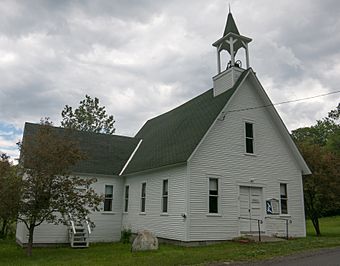Beaver Meadow Union Chapel facts for kids
Quick facts for kids |
|
|
Beaver Meadow Union Chapel
|
|

View from Beaver Meadow Road
|
|
| Location | North side of Beaver Meadow Road, Norwich, Vermont |
|---|---|
| Area | 0.1 acres (0.040 ha) |
| Built | 1915 |
| NRHP reference No. | 95000185 |
| Added to NRHP | March 09, 1995 |
The Beaver Meadow Union Chapel, also known as the West Norwich Union Church, is a historic church building. You can find it on Beaver Meadow Road in Norwich, Vermont. It was built in 1915. This church is famous because it was the starting place for the "Home Prayers" program. This program was a special way for people to get church lessons and sermons by mail. The building was added to the National Register of Historic Places in 1995.
About the Church Building
The Beaver Meadow Union Chapel is a simple, one-story building. It has a steep roof and wooden siding. The church sits on a stone foundation. A square tower rises from the roof near the front. This tower has an open bell area with a pointed roof. The main front of the church has a plain entrance in the middle. There are windows on each side of the door. More windows are in the bell tower above. A small kitchen area is attached to the left side of the main building. Inside, many of the original parts and furniture are still there.
A Look at Its History
The church was built in 1915. A schoolteacher from New York City named Margaret Kerr helped make it happen. She wanted a church built after a troubling event happened near her home. The land where the church stands once had a different church on it. That older church was moved to Sharon, Vermont.
People who would attend the church helped build it themselves. Ministers from nearby Hanover, New Hampshire, often led services. They mainly came during the warmer months of the year. One of these ministers was Reverend Allen W. Clark. He had a great idea. He decided to mail parts of the church service to people. These mailings included lessons and sermons. This was for times when the church was not holding services.
This idea grew into the "Home Prayers" program. It became very popular. By the time Reverend Clark retired in 1977, more than 23,000 people were getting these mailings. They came from 850 different churches.
See Also



